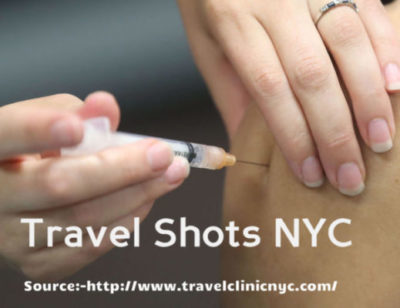

Traveling to a new place or country is exciting, especially if it’s your first visit.
Traveling gives you the opportunity to make cherishable memories with your family or friends. However, did you know it also increases your risk to develop health diseases that are not found in New York?
In the excitement of travelling to a new country, most people overlook their health and forget to visit their doctor, you should visit and consult with your doctor about any travel shots that you are required to get before going abroad. Although vacations are fun and enjoyable, your health should be your top priority. Therefore, while you prepare your travel checklist, visiting your primary care physician or travel clinic should be the first thing to do. This will help you learn whether or not you need travel shots before leaving New York. Also, your doctor will tell you the precautions you need to take while enjoying your vacation in a foreign country.
However, before you visit the nearest travel clinic, it is good to be well-informed so that you do exactly what your doctor recommends. A good doctor knows what to consider while recommending the travel vaccination or travel shots to their patients. To ensure you’re visiting an experienced doctor, it is important to know the things a travel doctor considers when deciding travel injections. Below we have explained the things your doctor will consider.
Are you traveling to urban or rural areas?
One of the important things your healthcare professional will consider is whether you will be visiting a developing country or a rural area. For example, most developing countries have more travel diseases, which means if you visit any of them you might need more travel vaccines before boarding.
How many days you will stay there?
Visiting for a short trip means your risk of developing any infection and disease is low. On the other hand, if you’re planning a longer trip, you’re at a higher risk of illness and need vaccinations for a longer trip.
Which season you will visit?
In the summer, illnesses like malaria are more frequent and dangerous and danger is far lower during the winter.
Where will you stay?
Do you know if you camp in the open air, you can be easily targeted by mosquitoes and other animal invaders and get unclean food and water? Hence, you’re at higher risk of developing malaria, typhoid, and more.
What is the mode of travel?
Traveling in the open air on tuk-tuks and bikes also puts you at a higher risk of getting an infection as compared to planes and trains. This is because the latter options are more clean and sanitized.
What type of activities you’re planning to do?
Activities that involve more adventure, such as hiking, safaris, and trekking increase your contact period with mosquitoes and harmful pathogens. Therefore, always carry a first aid box, mosquito repellent, and emergency medicine.
Food
Food is another important consideration. While vacationing in a foreign country, always watch over whatever you eat and drink. Avoid street food, and undercooked food in certain countries, especially developing.
In closing
Although traveling is fun, you should never compromise your health. Therefore, whenever you plan a trip to any foreign country, especially developing, it is important to visit a travel clinic before boarding.
